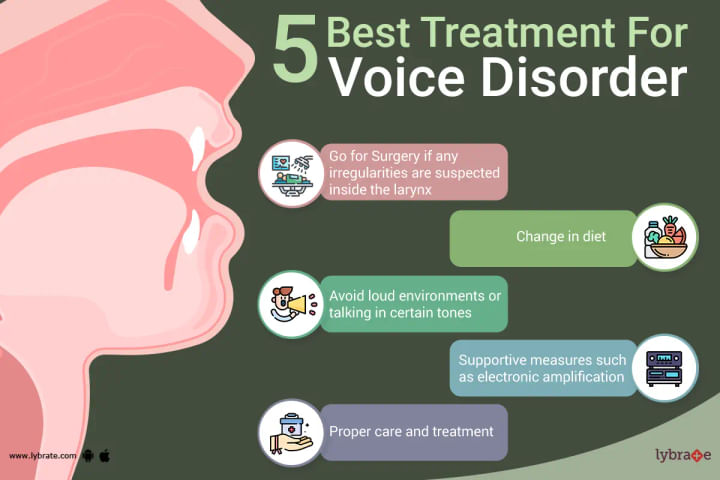Voice Disorders Types, Symptoms & Treatment
What are voice disorders?
Voice disorders are medical conditions affecting the sound of a person's voice. These can include factors such as hoarseness, loss of voice, vocal fatigue, abnormal pitch or loudness, breathiness, roughness, strained or strangled vocal quality, tremor and thickening of the vocal folds.
Voice disorders can be caused by medical conditions such as Parkinson’s disease or stroke; diseases of the larynx; allergies; trauma to the throat or neck area; vocal cord cancer; and by overusing or misusing the voice. They can also be due to poor speaking habits, incorrect breathing techniques and psychological issues such as stress and anxiety.
When the cause of the voice disorder is unknown or cannot be corrected medically, therapy may be needed to improve speaking abilities, reduce abnormal features in ones speech/voice production and improve overall communication skills. Voice therapy may also help a person develop healthier speaking habits.
What are the signs and symptoms of voice disorders?
Voice disorders can manifest through a variety of signs and symptoms which may include:
- Hoarseness or changes in the quality or pitch of the voice
- Breathiness, harshness, Nasal twang, a “frog” in the throat sounds
- Decreased range (loss of higher notes)
- Vocal fatigue (drainage after singing)
- A sudden onset of loss of volume while speaking or singing
- Pain while speaking or singing
- Throat tightness and/or pain, usually occurring after large vocal efforts
- Frequent throat clearing/coughing
- Elevated pitch.
What are possible complications of voice disorders?
Voice disorders can lead to a wide range of complications, affecting the person's physical and emotional well-being. Complications may include the following:
- Difficulty communicating effectively: People with voice disorders may find it difficult to understand and be understood when speaking, due to impaired speech or other alterations in vocal quality. This can interfere with interpersonal relationships as well as professional success.
- Social isolation: Struggling to communicate effectively due to a voice disorder can lead to feelings of social withdrawal and alienation from others.
- Depression and anxiety: Working with a clinician on strategies to overcome communication problems associated with a voice disorder can be emotionally challenging, creating feelings of frustration that may result in depression or anxiety symptoms on top of already existing stressors related to voice impairment itself (or other factors).
- Physical strain and pain: From straining the vocal cords due to an inability to communicate clearly or forcefully enough can cause fatigue, irritability, hoarseness, loss of vocal range or pitch control in addition to increasing risk for poor posture during speaking tasks which can complicate related respiratory issues (such as asthma) as well as neck pain making breathing even more difficult at times for some people with asthma in particular).
Common types of voice disorders
Common types of voice disorders include spasmodic dysphonia, vocal cord nodules, and musculoskeletal dysphonia.
Spasmodic Dysphonia
A voice disorder where tight muscles constrict the larynx, causing disruptions to the larynx's motions and generating a jerky or shaky voice. Symptoms may include difficulty sustaining a normal tone or volume, difficulty transitioning rapidly between sounds or pitches, and frequent loss of voice.
Treatment often involves speech therapy and exercises to strengthen affected muscle groups, as well as occasionally injections of botulinum toxin.
Vocal Cord Nodules
Vocal cord nodules are growths that develop on the vocal cords due to overuse and strain on the vocal cords. Symptoms of vocal cord nodules include hoarse voice, breathiness, muscle tension, and difficulty sustaining notes while singing. Treatment options for nodules range from voice and speech therapy to minor surgery to remove them.
Musculoskeletal Dysphonia
Musculoskeletal dysphonia is a type of functional voice disorder that results from inefficient use of the muscles involved in speaking and/or the inadequate coordination of the muscles. Symptoms include hoarseness, breathiness, vocal strain, vocal fatigue, and reduced loudness.
Musculoskeletal dysphonia can be caused by a variety of factors including poor vocal hygiene, psychological stressors, neurological conditions or diseases such as Parkinson’s or Multiple Sclerosis, smoking/alcohol use, certain medications and/or environmental allergens.
Treatment may include vocal rest and physical exercises such as lip moving exercises to strengthen the muscles involved in speaking.
Most common symptom of voice disorders
The most common symptom of voice disorders is changes in voice quality. These may involve decreased volume/harshness, tremors, hoarseness, breathiness/nasality, speaking too quickly or slowly/monotone pitch range.
Other symptoms may include pain and discomfort when attempting to speak or swallow food;
- Coughing
- Throat clearing
- Difficulty breathing
- Feeling like there is something caught in your throat all time; dry throat
- Straining while speaking/tired vocal cords
- Gagging sensation while talking
- Feeling like air is stuck in your throat all time.
As with any health issue, it is important for people with symptoms suggestive of a voice disorder to consult their doctor so that proper diagnosis and treatment can be initiated as soon as possible.
Treatments for Voice Disorders
Treatment options for voice disorders depend upon the type and severity of each individual's condition.
Common treatments include speech therapy - where techniques such as slow syllable rate exercises and regular vocal warm-up may be used - medications such as antibiotics if infection is believed to be causing symptoms
- Surgery if physical irregularities inside the larynx are suspected
- Dietary changes so as not to put further strain on the vocal system
- Avoidance strategies such avoiding loud environments/talking at certain tones
- Supportive measures such using electronic amplification when necessary.
- With proper care and treatment most people begin experiencing improvements within 1-2 months after initiating therapy sessions although it may take longer depending upon the individual's overall health status and condition severity among other factors.
What are the surgical treatments for voice disorders?
- Surgical treatments for voice disorders primarily involve a procedure known as laryngoplasty, which helps correct anatomical defects in the vocal folds (also known as vocal cords).
- It is usually performed by a specialist otolaryngologist and may include modifying an area of tissue on one of the vocal folds, or removing a small piece of tissue from the fold. In some cases, tissue grafts may also be used to augment or replace damaged tissue in the larynx.
- Other potential surgical treatments may include injecting fillers such as collagen into the vocal folds to improve their ability to vibrate, using lasers to cut and stiffen parts of the vocal fold, and replacing damaged parts with prosthetic material.
Best doctors to consult for voice disorders?
- It is best to consult an otolaryngologist (a medical doctor specializing in ear, nose and throat issues) for any voice disorders.
- An otolaryngologist typically evaluates the voice disorder and prescribes tests for further investigation and diagnosis of vocal abnormalities such as hoarseness or breathiness.
- They work with a speech-language pathologist who specializes in evaluating and treating communication difficulties due to various causes, including voice disorders.
- An audiologist may also be consulted to help determine if hearing loss is a contributing factor to the voice disorder.
- A speech therapist can then guide a patient through exercises of rehabilitation or therapy specific to the particular diagnosis of their voice disorder, such as vocal cord paralysis or muscle tension dysphonia.



+1.svg)
